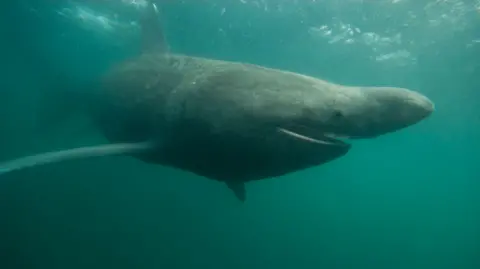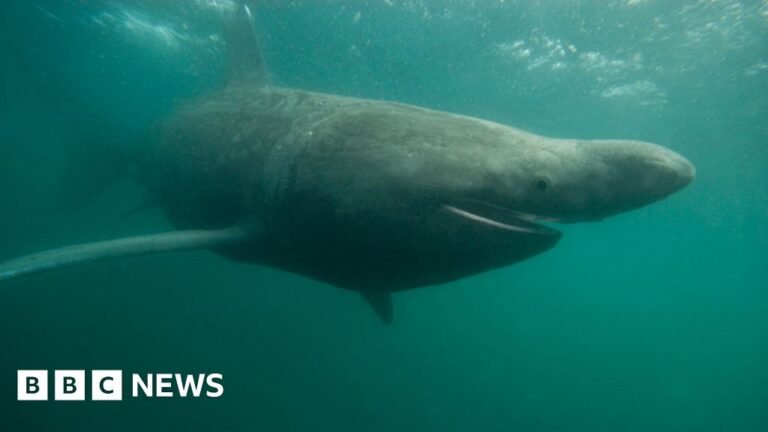Climate and science correspondent
 Getty Images
Getty ImagesThe UK could see a boom in endangered sharks, rays and native oysters as species move habitats to respond to rising ocean temperatures, according to scientists.
But some, including a clam that is the world’s longest living animal, could struggle to adapt.
Researchers at the Centre for Environment, Fisheries and Aquaculture Science mapped for the first time how 19 threatened marine species will respond to climate change in UK seas.
Many creatures could find new homes in parts of the North Sea predicted to become biodiversity hotspots in the next 50 years, although the disruption from climate change could also have negative knock-on effects on the marine ecosystem.
In May an intense heatwave warmed UK waters up to 4 degrees warmer than usual.
“As an island nation, we’re hugely reliant on the sea for our food and for jobs. Any changes that we see in our seas are particularly impactful,” Bryony Townhill, marine scientist at Cefas, told BBC News.
The analysis should guide the government as it plans how to ensure so-called Marine Protected Areas (MPAs) continue to protect species even as they change habitat.
The world’s oceans are warming as they have absorbed up to 90% of the additional heating created when humans burn fossil fuels like oil, coal and gas.
The UK seas are a hotspot for these effects of climate change and are among 20 places globally that have warmed fastest over the past 50 years.
Fishing communities and sea swimmers have already noticed the difference, with reports of jellyfish swarming near beaches or Mediterranean octopus hauled up in fish catches.
For this report, scientists looked at two different projections for sea temperatures, salinity and sediment levels until 2060.
 Getty Images
Getty ImagesThey compared the changing ocean environment to the preferred habitats of 19 species that are currently vulnerable in the UK.
The biggest winners are the native oysters, basking sharks, spurdog sharks – which can grow up to 1.6 metres – and thornbacks – a type of ray with spines.
Overall, mobile species will cope better, whereas static creatures will find it harder to adapt.
A small creature called a sea pen, which helps to build reefs, could lose up to 40% of their suitable habitat by the end of the century.
And the ocean quahog, a type of clam that can live more than 500 years, making it the longest living animal, is predicted to struggle.
A decline in those species could have knock-on impacts on ecosystems and food chains.
The scientists were surprised by some of the results.
“I didn’t expect that native oysters would do well. Frankly, they’ve been declining and disappearing for 100 years – and yet the climate model suggests they should be doing fine and perhaps even thriving,” says Prof Pinnegar.
 Getty Images
Getty ImagesBut he is careful to add that although there are potential new habitats, these vulnerable species must still be protected from threats like fishing equipment, disease or pollution.
“We’re not necessarily promising an increase in numbers – the seas still need to be managed carefully and other pressures reduced if the creatures are to thrive in new habitats,” he says.
The movement of these 19 marine species is likely to have a knock-on effect on coastal communities in the North Sea, including potentially bigger fish catches, according to Dr Townhill.
The findings are published in the science journal Marine Biology.
A separate study by the UK Met Office, published in the journal Weather, highlights the rapidly increasing likelihood of extreme air temperatures for the UK too.
The chance of seeing temperatures above 40C is now more than 20 times greater than it was during than 1960s, the scientists estimate. And those chances will continue to rise.
It means there’s a 50% chance of seeing a 40C day again in the next 12 years, they add.
Parts of the UK hit more than 40C for the first time on record in July 2022, during a heatwave which caused widespread disruption to transport networks and health systems.
Scientists at the World Weather Attribution group had previously found such temperatures were “almost impossible” without human-caused climate change.
Additional reporting by Mark Poynting




